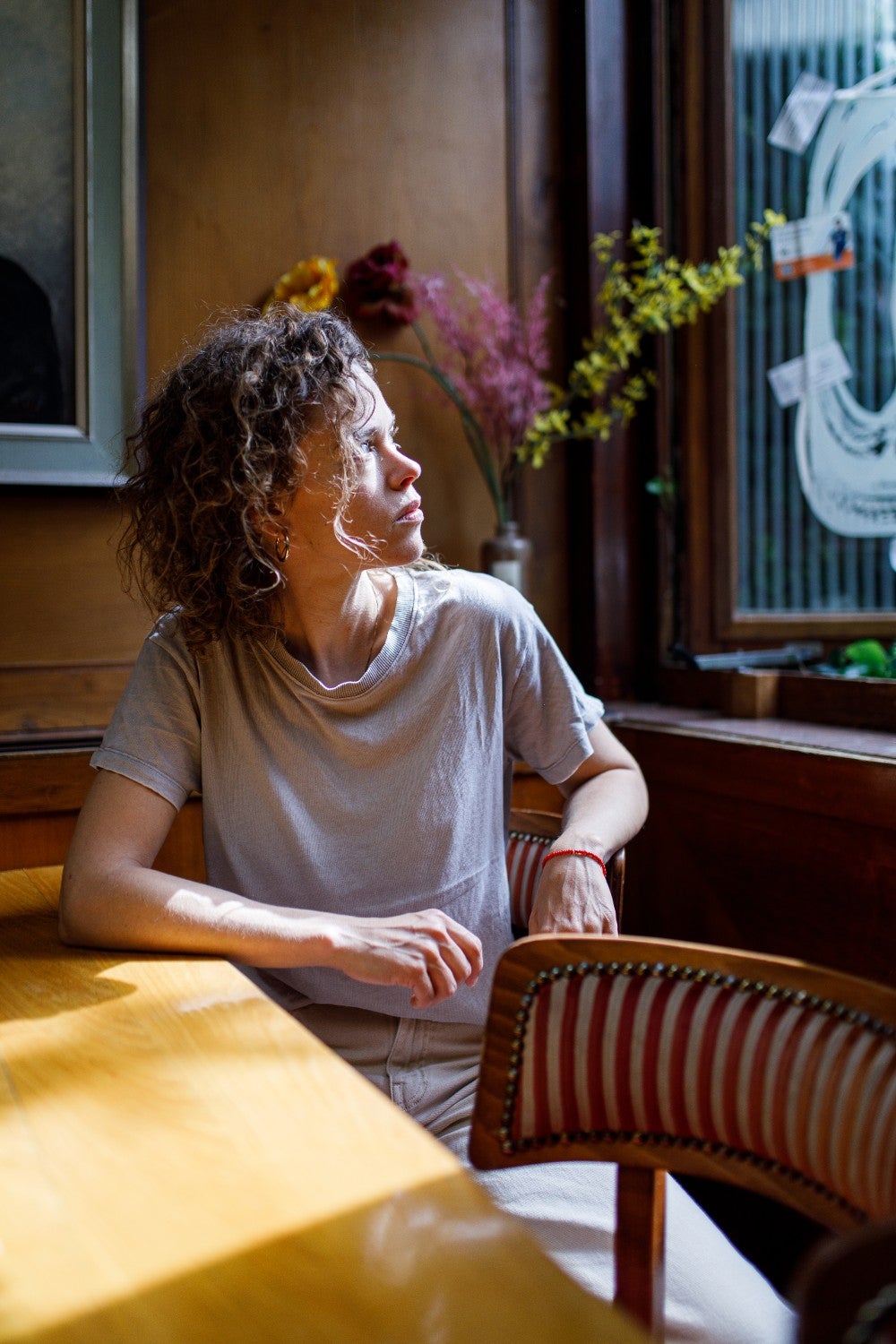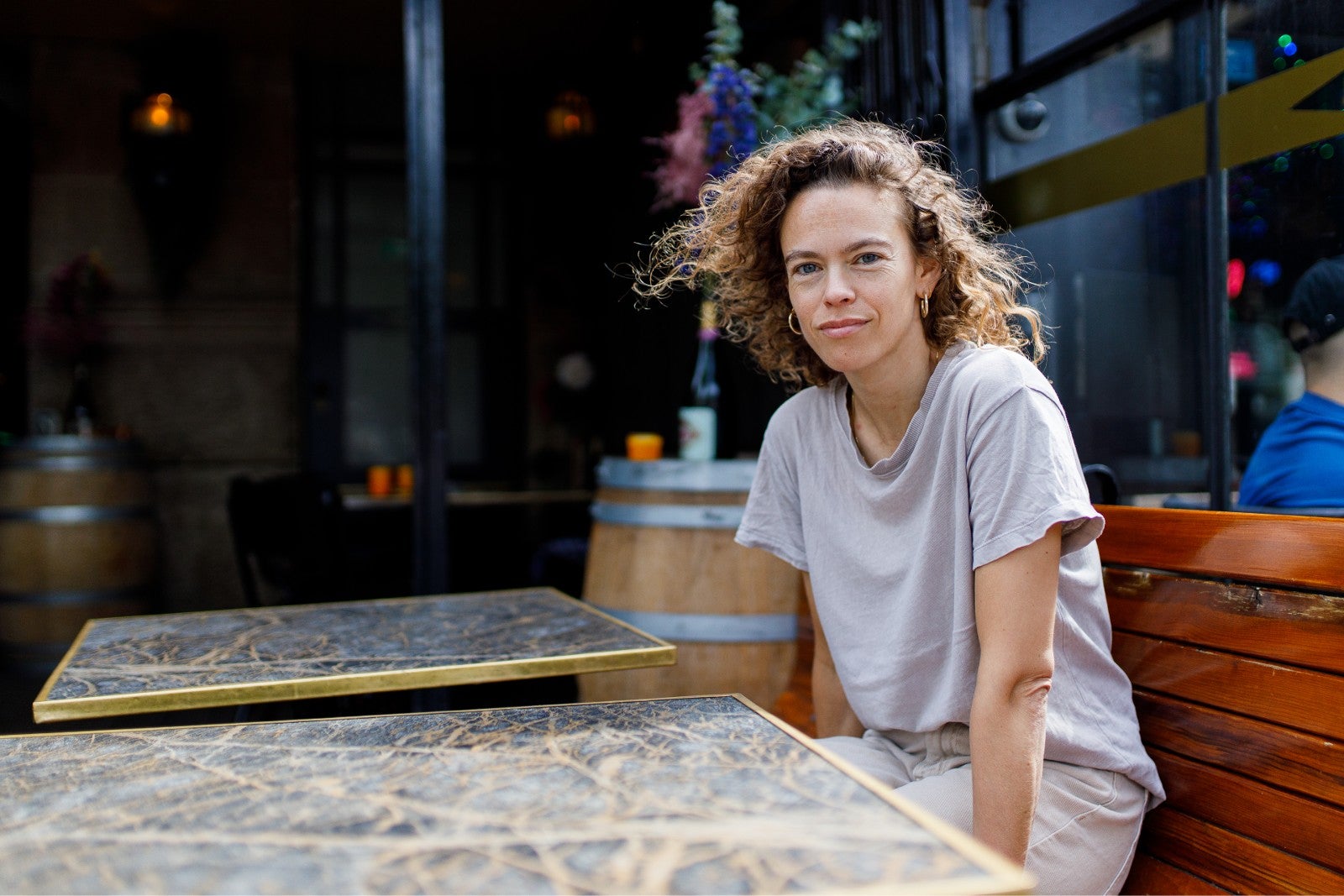Nina Polak (37) will be holding the position of Vrije Schrijver (Writer in Residence) at VU Amsterdam for the coming academic year.
Although she's typically reserved about discussing herself, saying, „Much of what I say about myself doesn't seem that fascinating", Polak opens up at Café Schiller, one of her favored spots. She delves into her fascination with the human psyche, her annoyance with terms like 'woke', and the complexities that silence introduces to families.
What are your plans for your position of Vrije Schrijver?
„At this stage of my life, I'm eager to connect with the younger generation and share my knowledge. I'm curious to explore, alongside students, the significance of literature in today's distracting world. Maybe we can link this to mental health. What role does reading play in personal and mental development? There are concerns about the mental well-being of students, although I'm not fond of the term 'mental health'."
Why is that?
„I see it as a clichéd, overly broad term. It omits considerations of ethics and morality, presenting the mind as merely healthy or not. This binary perspective oversimplifies humanity."
In both your novels and your journalistic work for the Correspondent, mental health - to put it anyway - often plays a role. Is it too flat to think that this fascination arose because your father is a psychiatrist?
„Maybe that made psychiatry a more attainable field for me, but the interest feels intrinsic. Even as a child I had an almost kitschy horror fascination with psychiatric hospitals. And especially for their clinical aesthetics. During my adolescence, I also watched the film Girl, Interrupted countless times. Even in my later life, I was always drawn back to literature about madness. It continues to fascinate me."
As you're about to engage with college students, how were you as a student in Dutch literature at the University of Amsterdam?
„In the first years I was not a very serious student. The content interested me, but I only did my best for teachers who inspired me. That changed when I completed my bachelor's in New York and saw how hard the students there - because of the high tuition fees - worked."
„I'm hyper-aware, analytical, and can overthink."
„I didn't have a definite future plan with the program. Actually, I wanted to go into theater as an actor, but I was rejected during the application rounds. Then I'll just read novels in the meantime, I thought, but the training turned out to be so much fun that I continued with it. I still benefit a lot from the concept of close reading that I learned during the course. What does this actually say? And what do I see in this? That has turned out to be an important skill for me."
Did academic knowledge hinder your writing at any point?
„Yes. Initially, I was a inhibited writer, possibly due to my academic background and deep understanding of literature. However, my nature also played a role. I'm hyper-aware, analytical, and can overthink. I think I have now found a way to make that my strength. It also forces me to be very precise."

„I find that precision lacking in the public debate. I have a lot of trouble with all the clichéd, imprecise terms being thrown around. Nobody knows exactly what you mean by a term like 'woke'. I think that is totally counterproductive when it comes to constructive conversation. The literature is precisely about precision and uniqueness in language. The language used in the debate is also so sparse."
„I can't take a selfie. I've always found that deeply embarrassing."
What struck me in preparing for this interview is that - unlike some other writers - you are hardly active on social media. Do you prefer to save your material for your books?
„Indeed, I think carefully about what I want to write and prefer not to spout raw material around. But I find social media undermining for several reasons. It is incredibly addictive and it gives a very different picture of reality. Moreover, I have always been reluctant to post things about myself. That's a natural aversion I have. I also can't take a selfie. I've always found that deeply embarrassing."
So how do you feel about doing interviews and focusing on the author behind the book?
„That's not my hobby either. I enjoy talking to you, but of many things I tell about myself, I think: it's all not that fascinating. My private life is not very fascinating. My background is not very interesting. Sometimes I think: I'll stop doing interviews."
What is it then that makes you say 'yes' anyway?
„Surely that is a kind of sense of duty to my book, I think. Look, you can also turn authorship into a show. I can appreciate that as entertainment, too. I admire Ilja Pfeijffer for the role of writer that he plays. That is a performance. You make a myth of yourself with that. I would love to be able to do that, but it's not in the cards for me."
„Often I think: 'What type of book would I enjoy reading myself?"
Your most recent novel Buitenleven, which is about two women leaving the city and moving to the countryside in the north of the country, sprung from the scenario that you and your partner had also almost taken that step. How do the ideas for your novels usually originate?
„For me, the beginning of a novel is always a relationship between people. Relationship dynamics inspire me. The environment and mood follow. For instance, for Buitenleven, I envisioned a somber setting for two individuals. Often I also think: 'What type of book would I enjoy reading myself?' That guides my writing. Now, for example, I feel like writing an extended family novel set in Haarlem."
What struck me about Buitenleven is the multitude of dialogues that come across as very natural.
"I hear from many writers that they can't or don't want to write dialogue. I actually find those the easiest. That's why I enjoy writing drama. I'm obviously very intrigued by how people sound and how they talk to each other. That's also why I'm so interested in those relationships. And in the unspoken sentiments between them."
Is that something you recognize yourself?
"I do find family difficult, yes. I love my family very much, but I also find it difficult to be with them. Because there is so much going on in families par excellence. You feel it all and at the same time with your own family you can hardly face it. With others - or in my books - it is again much easier to see, more pleasant too, because you yourself have nothing to do with it."
Nina Polak is VU's seventeenth Writer in Residence. She has been appointed for one year. The Writer in Residence is subsidized by the VUvereniging.






